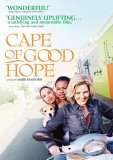| Reviews & Columns |
|
Reviews DVD TV on DVD Blu-ray 4K UHD International DVDs In Theaters Reviews by Studio Video Games Features Collector Series DVDs Easter Egg Database Interviews DVD Talk Radio Feature Articles Columns Anime Talk DVD Savant Horror DVDs The M.O.D. Squad Art House HD Talk Silent DVD
|
DVD Talk Forum |
|
|
| Resources |
|
DVD Price Search Customer Service #'s RCE Info Links |
|
Columns
|
|
|
Cape of Good Hope
More comparisons on the film's official website liken it to the ensemble work of Robert Altman, John Sayles and others, which is also technically true. Set in present day Cape Town, the story revolves around the struggling Good Hope Animal Rescue. Owner Kate (Debbie Brown) is carrying on with a married man, frequently heard on the other end of telephone conversations but not seen. Living off a trust fund, her life is a shambles, especially when her dotty oft-divorced mother (Clare Marshall) becomes involved with a man (Greg Viljoen) that was Kate's junior in high school. Morne (Morne Visser), a soft-spoken veterinarian and widower, is attracted to Kate and she to him, but she can't break free from her obsession with her married boyfriend, even though it's clearly doing her much more harm than good.
Meanwhile, the shelter's secretary, Sharifa (Quanita Adams), has with husband Habib (David Isaacs) been trying unsuccessfully to get pregnant, and worried that either she or her husband may be infertile. Meanwhile, black African Jean Claude (Eriq Ebouaney), a Ph.D. graduate in astronomy forced to flee his native Congo during the war, now divides his time between the animal shelter and the local planetarium, where he volunteers on his day off. He falls for a widowed mother, Lindewe (Nthati Moshesh), who lives with her pushy mother (Lillian Dube) and young son, Thabo (Kamo Masilo). Lindewe, meanwhile, works as a maid for snotty, rich Afrikaners while going to college part-time.
These stories eventually intertwine in predictable and, a few times, surprising ways. The film is selling itself as uplifting human drama and in that it succeeds. It goes a little overboard here and there, with Mark Bamford and Suzanne Kay's screenplay crammed with more characterization and incident than is really necessary. Busy Jean Claude, for instance, is grappling all kinds of issues: his Congo past, deprogramming a vicious Rottweiler trained to attack blacks on sight (shades of Sam Fuller's White Dog), applying for emigration to Canada, falling in love, dealing with troubles at the planetarium, not being able to apply his education, etc. Of course, in an age when most movie characters are as thin is cardboard, to complain about too much characterization seems downright perverse.
The picture also gets points in the addressing modern social issues: racial discrimination (including blacks against other blacks), class discrimination, familial discord, crime, rape, animal abuse, sexual matters - an uneventful movie this ain't - in a way that's neither heavy-handed nor crassly introduced for cheap emotional impact. (It does opt for a couple of cheap if crowd-pleasing laughs, however.) Apparently one of the filmmakers' goals was to present a collage of modern, post-Apartheid South Africa at its best and worst, and Cape of Good Hope succeeds in this regard also.
(Mild Spoilers)
Bamford and Kay - he also directed it, she produced - show some cleverness in unveiling and staging its drama. One heartbreaking scene finds Jean Claude at the planetarium talking astronomy to a group of children hanging on his every word. When they leave the camera pulls back to reveal that he's not actually a guide as the audience has been led to believe, but rather he works as janitor whose job it is to mop up.
Video & Audio
Cape of Good Hope is presented in a disappointing unenhanced transfer, 4x3 letterboxed to about 1.77:1. The image is otherwise okay, but why not 16:9 enhance the transfer? Two mixes are offered: Dolby Digital 5.0 surround and Dolby Digital 2.0 stereo; there are no subtitle options. (The film's relatively small amount of non-English dialogue uses non-removable subtitles.)
Extra Features
Modest supplements include a 4x3 letterboxed trailer and just under five minutes worth of raw interview footage with director Bamford and co-star Ebouaney, curiously positioned in a two-shot that makes Bamford look like a ventriloquist dummy resting on Ebouaney's lap.
Parting Thoughts
Despite a lackluster transfer, Cape of Good Hope offers viewers a chance to experience something like the daily life of ordinary South Africans, to see its many cultures interact in a story that's ultimately quite enjoyable. Recommended.
Film historian Stuart Galbraith IV's most recent essays appear in Criterion's new three-disc Seven Samurai DVD and BCI Eclipse's The Quiet Duel.
|
| Popular Reviews |
| Sponsored Links |
|
|
| Sponsored Links |
|
|
| Release List | Reviews | Shop | Newsletter | Forum | DVD Giveaways | Blu-Ray | Advertise |
|
Copyright 2024 DVDTalk.com All Rights Reserved. Legal Info, Privacy Policy, Terms of Use,
Manage Preferences,
Your Privacy Choices | |||||||















